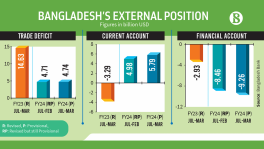The inconvenient truth that could prevent global famine
Hunger caused by the Ukraine war is one more uncomfortable symptom of the world’s refusal to adopt more sustainable agriculture policies and plant-based diets

Global agricultural policies have averted hunger, but have also enhanced illness, environmental degradation and climate change while wasting natural resources and undermining biodiversity. The need to rethink those policies has been clear for decades, yet little has changed. Just as it would be a shame to waste the Ukraine crisis by failing to rethink energy policies, it would be equally disheartening if we fail to use this war as an opportunity to rethink our agricultural policies.
Famine in countries around the world, most markedly in Africa, is said to be inevitable. It stems from the presumed loss of Russian and Ukrainian wheat output, about 100 million tons a year or a quarter of the world's total, and Russia's exports of nitrogen fertiliser, about 7 million tons annually pre-invasion, or 7 percent of global use. For April, the food price index published by the United Nations Food and Agriculture Organisation was up 30 percent from a year ago. Global fertiliser prices were up 125 percent in January from a year before, and rose another 17 percent from the beginning of the year to March.
Given the seasonality of agricultural production and lingering supply-chain problems, no policy shift can combat this year's shortfalls. But famine is still avoidable. The US and Canada now have about 44 million tons of wheat in their stockpiles. North American lesser grains double these stocks to levels that can fully sustain 45 million people for a year. Wealthy nations' stocks of dry legumes and nuts raise this to 50 million person-years just months away from the next North American wheat harvest.
And then there is livestock feed. Over 250 million tons of wheat, barley, oats and other cereals are globally used for feed, with more than 90 million in the US, Canada, western Europe and Australia alone. This investment delivers shockingly little. One hundred kilograms of feed protein served to livestock yields 10 to 15 kilograms of egg, dairy or poultry protein, or only 3 kilograms of beef protein. The world thus annually sacrifices for livestock production at least 220 million tons of nutrient-rich cereals, more than double the Russian and Ukrainian wheat shortfall.
The wheat famine in Egypt, Tunisia and Yemen expected this year, as well as the political unrest that such food shortages sometimes propel, could therefore be prevented by utilising existing cereal and legume stocks and redirecting grain from livestock feed to lifesaving human food. But such measures are inherently temporary. What about the long-term future?
Consider the diets of two hypothetical people. The first eats the mean US diet, in size and composition. The other's diet is identical in every way, except the beef Americans normally consume — some 50 to 70 grams daily — is replaced with a diverse, nutritious mix of plant-based alternatives. Comparing resource needs of only the beef or its plant-based alternative, that portion of the diet requires about 0.3 acres of cropland and more than 12 kilograms of nitrogen fertiliser annually for the beefeater, but less than 0.1 acres and 3 kilograms of nitrogen fertiliser for the plant eater.
We can use the beef-to-plant replacement to counteract future wheat shortfalls like the one created by the Ukraine invasion. With annual wheat yields of about 1,300 to 1,400 kilograms per acre in the US and Canada, and 2,700 to 3,600 kilograms in northwestern Europe, fully making up the shortfalls by producing 50 million additional tons of wheat in each continent requires 36 million to 38 million acres, and 14 million to 19 million acres, respectively.
Each person who replaces beef with plants saves almost a quarter-acre, which would free these acreages. To fully offset such shortages as the one caused by the Ukraine invasion requires 215 million to 250 million North Americans and Europeans adopting the beef-to-plant transition, which will reduce current North American and European beef consumption by 42 percent to 45 percent and 14 percent to 18 percent, respectively.
Such a transition would be fertiliser-neutral, with the dietary shift saving just enough fertiliser to offset the elevated demands for extra wheat to counteract hunger in Ukraine. Because the beef-to-plant transition saves about 10 kilograms of fertiliser per person, the 215 million to 250 million people now eating a plant-based diet will save 2.2 million to 2.5 million tons of nitrogen. The extra fertiliser the added wheat acreages would require is the mean nitrogen fertilisation rates for US and EU wheat — 41 and 56 kilograms per acre per year, respectively — times the required 36 million to 38 million and 14 million to 19 million new wheat acreage, and 2.3 million to 2.6 million tons of fertiliser. The beef-to-plant transition would thus save nearly the full fertiliser costs of producing the extra wheat to combat hunger created by the war in Ukraine, which is essential in light of the missing 7 million tons of Russian fertiliser exports.
Beyond saving millions from hunger with no added fertiliser needs, the partial dietary shift will reduce cardiovascular disease and cancer death rates by 10 percent to 18 percent. Those who go the extra mile by forgoing all meat will enjoy even higher reductions, while also lowering their weight and blood cholesterol and glucose levels.
If, as predicted, millions will soon go hungry, it will not be a "Putin famine" but a readily preventable famine of choice, arising because the people and leaders of wealthy nations have decided that preventing it is too inconvenient.
Gidon Eshel is a research professor at Bard College. A geophysicist, he is author of "Spatiotemporal Data Analysis" and the upcoming "Planetary Eating."
Disclaimer: This article first appeared on Bloomberg, and is published by special syndication arrangement.


 Keep updated, follow The Business Standard's Google news channel
Keep updated, follow The Business Standard's Google news channel
















